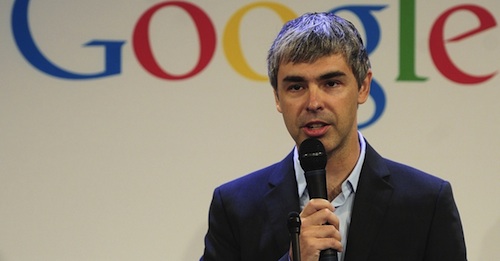There has been heat in the press for some of Larry Page’s comments at this Khosla Ventures “Fireside Chat” recently. You can read all about it here, but essentially, here’s what the Google co-founder said:
“If you really think about the things you need to make yourself happy — housing, security, opportunity for your kids … it’s not that hard for us to provide those things,” Page said. “The idea that everyone needs to work frantically to meet peoples’ needs is not true.”
Page said the world should be living in a “time of abundance” in which robots and machines could help meet everyone’s basic needs much more easily.
He explained that people have a desire to feel needed, wanted and productive, often leading them to work in industries the world doesn’t necessary need, thus contributing to the destruction of the environment.
Most of the criticism of this concept comes from two contextual places:
1. The three people on the stage are each billionaires, so how connected can they really be to the day-to-day worker’s world?
2. Work is a way that many people derive and approximate their value in the world, so thinking that work time could be reduced is an aghast notion to many.
(There’s also the whole robots thing, which terrifies people.)
Honestly, though — Page isn’t really wrong. The way most jobs are set up for the knowledge economy makes little to no sense. Think about it: you went to college and sat in classes with 100 other people, let’s say. Of those 100 other people, they had varying degrees of intelligence, passion, ability to contextualize information, and desire to learn, right? Now, years later, those same 100 people become your co-workers at Firm A in Industry B. Why are all of you working M-F, 9-5 or 10-7 or whatever — if you’re all clearly different and can approach things differently?
Phrased another way: the same project or idea can take Person A and Person B different amounts of time to do. Why is work an attempt at standardization when the people are so different?
Some revolutionary thinking is needed in this space, whether that comes from robots and self-driving cars or it comes from top-level executives really thinking to themselves, “Oh, we’re applying industrial era work principles to a knowledge economy. Why?”
In sum, maybe the future of work is part-time — and so long as food and housing and other main prices can be kept relatively in check, maybe that’s not necessarily a bad thing. People with more “leisure” time — not grinding on projects and meetings for Organization A — could help create a new “Golden Age” of sorts. In the middle class, where the rat race really seems to be the most tangible, you see a lot of people who are incapable of doing anything except working all home, coming home, seeing the kids, having dinner, sleep, rinse, repeat. What if those people had a few hours back every week? That’s not necessarily bad. Maybe they could add value somewhere else.
Obviously this requires a lot of shifts in thinking, both at the organizational level and at the personal level, but if the future involves working a little less and living a little bit more, that’s not the worst thing a billionaire has ever proposed at a private event.
